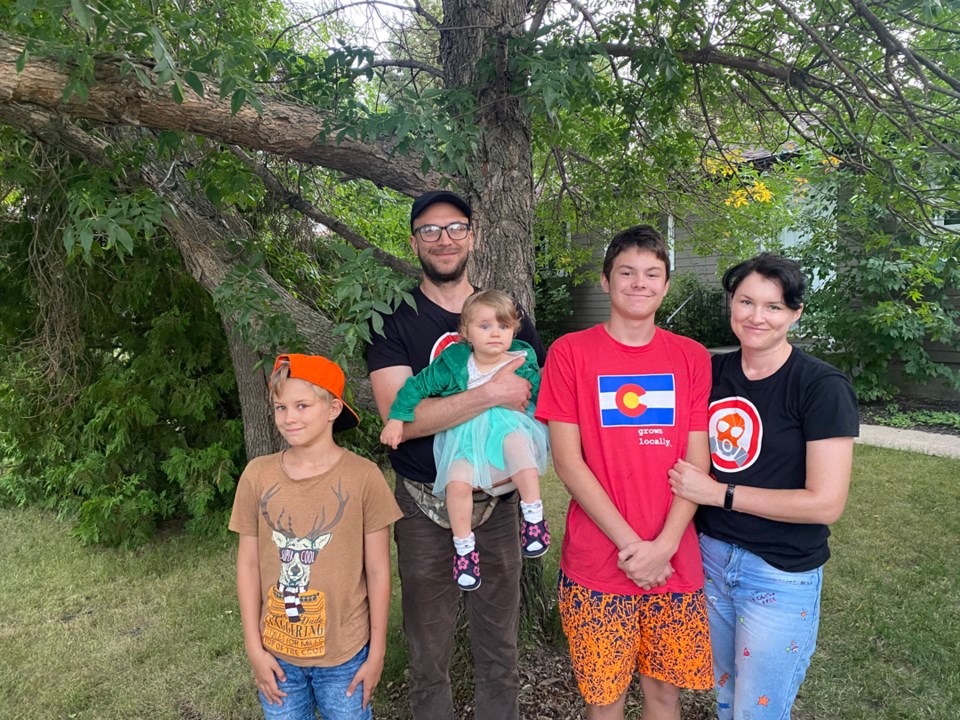CARLYLE - In early August, the Town of Carlyle welcomed its first new Ukrainian family.
With the outbreak of Russia’s war on Ukraine, the Boiko family had fled to neighbouring Poland. In July, they came to Canada on a flight destined for Regina. At the subsequent job fair held at the University of Regina, the Pig Improvement Company (PIC) offered them employment at their Carlyle Atlas location.
Serhii and Yuliia Boiko have three children. Their eldest son Ilya will turn 15 on Aug. 28. Son Kirill is 10 and daughter Viesna is 15 months old. Translated from her home language, Viesna means spring.
They have a dog, Martin, who is a three-year-old purebred golden Lab and he was able to join them later in their journey.
Judy Valentine is the manager of the Carlyle Housing Authority. A housing residence became available, and the family was able to immediately move into a rental property on Mountain Drive.
The Boikos lived in the city of Krivoy Rog, located in central Ukraine. It is the seventh largest city in the country and has a population of 650,000. Krivoy Rog was built beside massive iron ore deposits and the city is 126 kilometres long, paralleling those deposits. It is the hometown of Ukrainian President Volodymyr Zelenskyy.
Both Serhii and Yuliia were employed in the mining industry. Serhii worked with refractory material in metallurgical units such as open-hearth and blast furnaces, air heaters, trenches and pipelines. For more than 10 years, he was employed by ArcelorMittal, the largest private company in Ukraine.
Yuliia was an engineer in an iron ore mine. The depth of the mine was over 1,500 metres. She designed workings in the mine and calculated the number of explosives needed to break up the iron ore mass. Both jobs provided them with a high standard of living.
The war with Russia began in late February and Krivoy Rog began to receive air missile attacks. ArcelorMittal closed their mines and halted all production in March. Yuliia and the children fled to Poland.
Yuliia became very emotional talking about their move to Canada.
“When I decided to go to Poland on the fifth day of the war, I was sure that everything would be settled in a week. That there could be a war in the 21st century in the centre of Europe. Now I am not surprised at anything. If tomorrow they tell us that aliens have flown to us, then I will say, ‘I don’t see anything strange.’ Nothing surprises me anymore.
“When I went to Poland with my children, I did not take the dog with me, because it’s only for a week, I thought. A month later, I found volunteers from Ukraine who helped me get my dog out. I often cry watching the news, I get angry at countries that are tolerant of Russia. Yes, I don’t understand anything about politics. That is why I am crying from powerlessness.”
Yuliia continued her story.
“Because Krivoy Rog is so big, we always wanted to get away, at least on weekends, to somewhere in a quiet place. Arriving in Canada, this desire became stronger. I was scared to live in a foreign city, in a foreign country, not knowing the people and not knowing what to expect from people. In Carlyle. I am calm, I am not afraid for the children.”
“Of course, I will miss my past life,” she added. “We had to leave everything and learn to live again. In our family, I have the hardest time adapting to a new life. But everyone supports me.”
After all medical, immigration and work visa requirements are met, the Boikos should commence employment at the Atlas PIC Facility in early September. They have purchased a vehicle and are more than willing to give their new lives a try. School will begin in September with translators being provided by the South East Cornerstone Public School Division.
When Yuliia was asked about meeting the people of Carlyle and being offered any sort of assistance, she said: “It seems to me that sometimes our family looks from the outside as not being friendly. It happens in moments of despair, when we all feel dumb when we can’t say a few words in response. Then, we all want to hide.
“One day we will learn the language, I hope. Any help, financial, material and moral, is priceless for us. We are very grateful for everything.”






